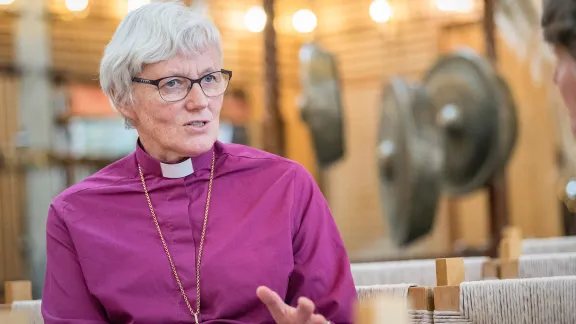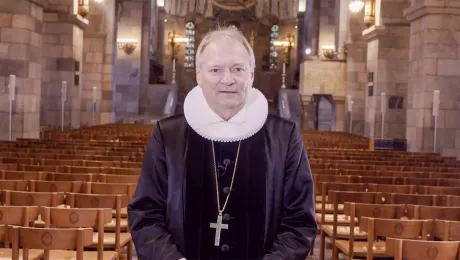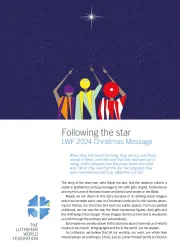
Church of Sweden Archbishop Antje Jackelén. Photo: LWF/Albin Hillert
Swedish Archbishop Antje Jackelén is part of interfaith ‘Coronaspection’ project
(LWI) - Church of Sweden Archbishop Antje Jackelén is among several dozen leaders of different religious traditions who offer personal insights from the Coronavirus pandemic as part of an online project pioneered by the Elijah Interfaith Institute. Founded in the late 1990s, the institute brings together Jewish, Christian, Muslim, Buddhist, Hindu, Sikh and Bahai leaders to build friendships and share the rich spiritual resources of their various faith traditions.
As part of the institute’s mission to engage with pressing contemporary issues, the ‘Coronaspection’ project sets out to explore many of the unsettling questions brought sharply into focus by the deadly pandemic and resulting lockdown of 'normal’ life in countries across the world. Theologians, teachers, preachers and leaders talk frankly about their feelings of fear, frustration, pain and grief, as well as the ways they have learnt to cope with the sudden, dramatic changes in personal and community life.
The institute’s found and director, Rabbi Alon Goshen-Gottstein, is a longtime friend of many of the people featured in the project and conducts most of the online interviews himself. Others, like Pope Francis or Orthodox Patriarch Daniel of Rumania, share hopes and thoughts on the crisis through sermons or pre-recorded reflections. Alongside the full YouTube interviews, the website also offers bite-sized ‘gems of wisdom’ from each speaker and a catalogue of texts and biographies.
Overcoming anxiety and fear
In her conversation with Rabbi Alon, Archbishop Jackelén, who serves as the Lutheran World Federation vice-president for the Nordic region, reflects on the way the pandemic has sparked deep anxiety and uncertainty within Swedish society. While on the surface, it is a very secular country, she says, “if you scratch the surface a little, there is a hunger and thirst” for spiritual insights that can help people cope with their fears for the future at this time.
“The answers that we can offer […] are grounded in our faith tradition,” she continues, but should not necessarily be phrased in “theologically exclusive language. Comparing the fear of the disciples, isolated and alone on Easter Saturday, with the anxieties of people quarantined by the Coronavirus, she says the main challenge for the church is to help people adapt and find courage to respond to the crisis in positive and creative ways.
Prayer is a powerful way to widen our horizons, gather new courage and get a change of perspective on issues
The Lutheran leader talks about “the transformative power of prayer” and the need “to cultivate spiritual resilience,” rather than projecting anxieties and fear onto others. The practice of prayer, she says, is a powerful way “to widen our horizons,” “gather new courage” and “get a change of perspective on issues.” Spiritual wisdom, she insists, will always encourage us to “look after the most vulnerable and acknowledge that the crisis we experience is different from that in countries where you don’t even have soap or sanitizer.”
Noting that the pandemic has raised important new theological reflections around the nature of evil, personal and structural sin and the limits of free will, Archbishop Jackelén expresses hope that people will emerge from the crisis with powerful new insights and “a new sense of proportion,” particularly regarding the climate crisis. “The church should be a voice of hope and prayer,” she concludes, “a place to harbor anxiety and grief” and “a source of inspiration for good moral action,” helping to transform anxiety into love of neighbor and care for creation.


